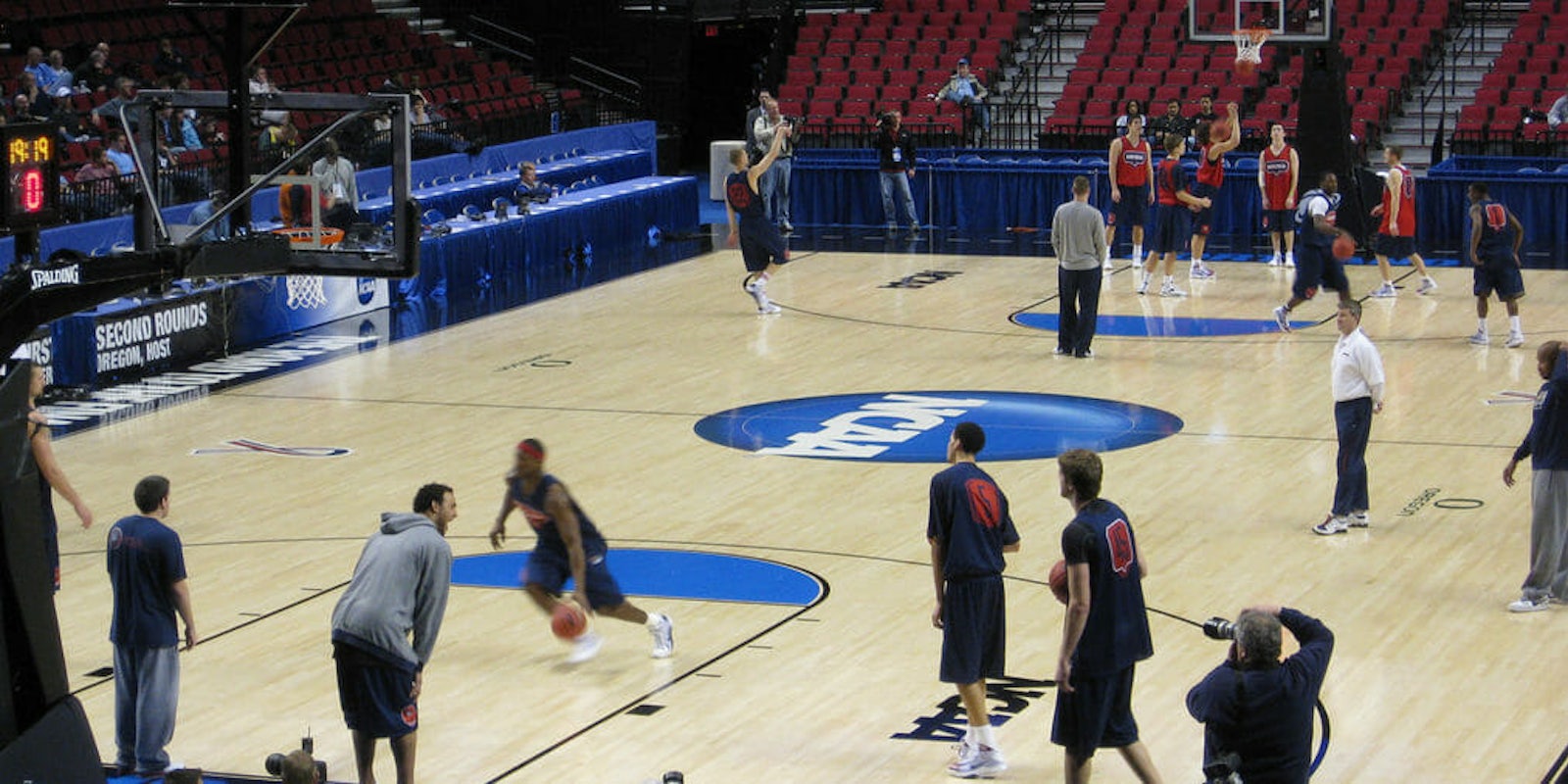“I do have Gonzaga as the overall winner,” Dr. Tim Chartier tells the Daily Dot. Everyone is picking their favorite team ahead of tonight’s NCAA championship game between the Gonzaga Bulldogs and North Carolina Tar Heels, but Chartier is no ordinary pundit. He’s a math scholar with one of the best brackets in the country.
It’s been a strong March Madness for the Davidson College professor. His research team, which includes three students, was positive that lowly Middle Tennessee State would upset Minnesota. Their data likewise projected mid-major Xavier for a deep run, and even though the Vegas line favors North Carolina in tonight’s title game, he feels confident in the Bulldogs’ chances, factoring in things like margin of victory, defensive efficiency, strength of schedule, and total possessions—and he’s not the only data expert to think so.
This year Chartier partnered with Play the Future, an app-based gaming platform where anyone can make predictions across sports and culture to win prizes. The contest’s other pundit, Stanford data scientist Ed Feng of thepowerrank.com, also entered a Gonzaga pick. Hoops statistician Ken Pomeroy of numbers paradise kenpom.com concurred. He wrote that Gonzaga actually had an overwhelming 20.5 percent chance of winning it all when you factor in all 68 teams in the field. (By comparison, the Tar Heels were given just a 9.9 percent chance of cutting down the nets tonight, which is still significant compared to, say, New Mexico State’s .001 percent chance to win.)
“We try several different methods and look for the trends around them,” Chartier says. “I wasn’t sure about Gonzaga, and a lot people were like, ‘Well they’re not as tested.’”
But isn’t the joy of March Madness in its chaotic variance? The numbers are fine context, but this is an emotional tournament filled with buzzer-beaters and weeping teens, one that, when it’s over, still results in the co-worker who picked the funny mascot somehow winning the office pool’s gift certificate to Applebee’s. But analytics experts like Chartier are getting better at figuring out the factors that make or break a team in the tournament. Networks like ESPN, which lean on the expertise of people who play and coach basketball for analysis, are likewise turning the emotional pageantry of March Madness into a numbers game. In fact, ESPN tweeted on Sunday, “This is the 3rd straight season that 2 of the top 3 teams in our Basketball Power Index will meet in the Championship Game.”
“You need to decide: ‘Are you going to let emotion play a role [when filling out your bracket]?’” Chartier says, noting that it’s an inevitable part of the research that becomes tricky to avoid “even if you’re using a purely mathematical point of view.”
For instance, some of his projections favored Villanova, the suburban Philadelphia school that won the title last year. Chartier got emotional and pulled the plug, and his gut was spot on: The defending champs lost in the round of 32 against low-seeded Wisconsin.
“I look at it as the coin might have been 90 to 95 percent likely to flip to Villanova, and it didn’t,” Chartier says. “We had these two different models which both can do well… But 1) it’s very hard to repeat, and 2) we’ve gotten burned with Villanova a couple of times in the past. I didn’t feel comfortable having that happen again.”
The numbers are objective, but Chartier says that a fundamental understanding of basketball trends and culture is paramount. As this research expands, Chartier says that the analytics community is closer than ever to deconstructing the elements that not only comprise a true contender but the “Cinderella detections” that can weed out the teams that annually crash the party.
“Because you don’t know when a team will be hot, there’s two parts to being a Cinderella,” Chartier says. “One is the potential and the other is being ready.
“To have that Cinderella run you have to be playing the right teams,” Chartier continues. “I feel like a lot of times pundits tend to see [basketball] in a more narrative way.”
It’s a core tenet of Chartier’s year-to-year bracket research. After tonight, he’ll rank this season as a whole relative to past tournaments for outliers and degrees of turbulence. Basketball is different these days, he says, mostly because high-talent freshman leave for the pros after one year and Chartier can no longer use the “longevity data” he’d map as junior guards turned into seniors. While his students are still researching this “one and done” type of team, Chartier doesn’t love betting on them.
“It felt like really good teams would fall apart in March Madness if they got behind in a way they weren’t used to,” he says. That was certainly the case of superstar-driven, freshman-rich schools like Kansas, UCLA, and Kentucky, all of whom struggled to regroup in the tournament once the game strayed from their comfort zone.
Out of thousands of Play the Future entrants, Chartier’s team is poised to finish in the contest’s top 10. But headed into Saturday’s semifinals, Chartier noted that the leading bracket entry was filled out by a student. He sees that as a win for STEM and is thrilled by the prospect of losing to a kid: It’s another strand of data to synthesize into next year’s bracket.


